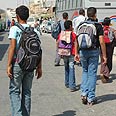The State, the report's authors say, has not only failed in preventing this situation, but has also encouraged it by legitimizing segregation moves led by schools.
The comprehensive report, authored by Dr. Shlomo Swirski and Attorney Noga Dagan-Buzaglo, is titled "Separation, Inequality and Loosening Control – The State of State Education in Israel". It reviews the education system's situation from a variety of aspects and includes statistic data on the number of children in the different streams throughout the years, trends in academic achievements and budgetary figures.
The writers analyze, extensively and from a historic perspective, the different systems' detachment from Education Ministry, which today only controls some of the schools belonging to the state stream.
The report reviews the detachment of the haredi stream ("recognized but unofficial"), which includes the independent education of Ashkenazi Orthodox parties and Shas' Maayan Hahinuch Hatorani school network, the ideological segregation of the state religious stream, and the separate education in the Arab sector (which is divided into several sub-streams).
'Natural selection' in favor of rich
But the most interesting trend analyzed by the report is the way well-established urban classes take advantage of the State's withdrawal in order to create, inside the public system, a separate education system "for rich only" – in which the schools' activity is mostly financed by funds infused by the parents directly into the school, creating a "natural selection" between children whose parents have the money and those who don't.
The State, the report claims, contributed to this situation by allowing the parents to infuse funds and allowing the schools to accept them, by failing to enforce integration in junior high schools between strong and weak social classes, by opening registration areas, by encouraging private enterprises in the schools and by not imposing sanctions on schools which do not teach the required subjects.
The result, the Adva report says, is that pupils in each school essentially study a different curriculum, which is largely determined by those who invest money in the institution, and this is also expressed in the students' achievements.
The Education Ministry has tried to solve part of the problem by providing additional study hours to underprivileged communities. However, the researchers explain, the local councils provide extra hours themselves, making the strong and well-established councils even stronger.
'Pink-collar profession'
An extensive part of the report deals with the schools' financial resources and reveals that the Education Ministry has completely lost the ability to supervise the funds collected by the schools for extra-curriculum activity. Under this wide banner, the schools manage to collect funds from parents, donors and businesses, while the authorities are unaware of the volume of the budgets and their use.
Another part of the study is devoted to the teachers' status. The report points to burnout among the teaching force, a historic drop in the profession's prestige, and organizational segregation – the teachers are represented by two different organizations and have been split into sectors (primary and post-primary).
Education, the report states, has turned into a "pink-collar profession": There are almost no men in it, and most of the teachers are from the medium and medium-lower class. Simultaneously, the processes mentioned earlier have caused well-established families to detach themselves from public education, leading to a split in the education force and damaging the teachers' collective status.
An Education Ministry official said in response, "The ministry will gladly address the report after receiving and studying it."

















